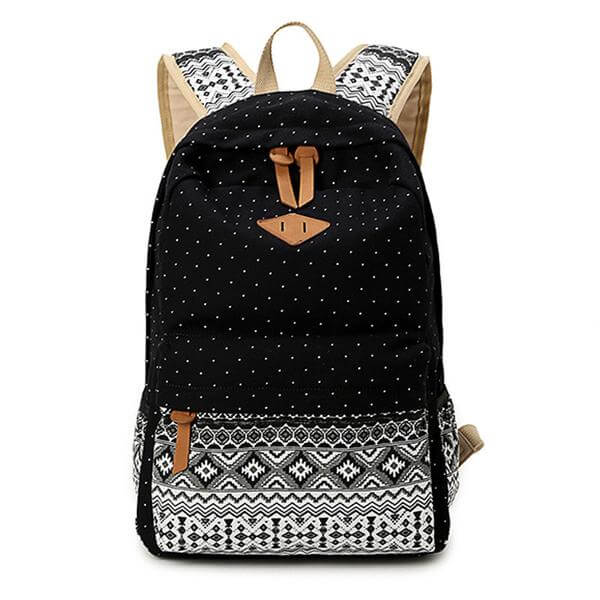A suitcase and a carry-on only go so far. So does your inflexible, Debbie Downer personality. Getting ready to study abroad? Check out these essentials to make the most of your luggage space – and your trip.
1. Raincoat
Rain probably exists in your choice of country, so you need some protection. That is, unless you seek the waterlogged rat look (see #9). Keep dry with a quality raincoat and leave the umbrella behind. It saves you from looking like an idiot trying to hold on to a mangled umbrella on a windy day. Many raincoats compress, so you can carry them around with ease, unlike umbrellas.
2. Band-Aids
Studying abroad obviously requires you to study, but involves even more walking. You will walk and walk and walk and collect many blisters, even with the most comfortable of shoes (see #7). Plus, if you’re the adventurous type, you may need a bit of assistance after a rock-climbing scrape. Carry around a few Band-Aids in your backpack for all kinds of foreign boo-boos.
3. Open Mind

Don’t retreat away from things you’ve never tried, or even things you think you won’t like. This goes for food, excursions and everyday activities. You’ll regret missing out more than you will regret spitting out a specialty soup you tried, but hated. A new country endlessly provides new opportunities; take them up to make the most of your trip.
4. Small Refillable Water Bottle
Dehydration not only ruins days, but lives. Okay, maybe not lives, but it can be very detrimental to your health and possibly ruin a good portion of your trip. Stay hydrated. Carrying a small water bottle in your hand while you walk not only ensures that you won’t forget to keep drinking, but also that you always have access to a drink. A small bottle guarantees it won’t be a bother to carry around.
5. Small Notebook
Your parents will ask for a complete play-by-play of everything you did, and surprisingly, you’ll actually want to tell them. Some students opt to create a blog for their families to follow along, but keeping a small journal (even with simple bullet points) helps you remember the cool little things about your trip. Even better, it’s simpler than carrying around your phone and using Notes to quickly jot down directions, ideas or day plans. Leave the valuable stuff at home and opt for a nice little notebook.
6. Sense of Adventure

My friend and I visited London for a week and on our first night, we ate Chipotle for dinner. Looking back, it doesn’t get sillier than that. You may think you’ll revisit this country in the future, but you probably won’t, so do everything you can. Go to touristy places and places you’ve never heard of; ask a native about the least-known hotspots and go. Without a sense of adventure, you may as well have stayed home and done the same old stuff.
7. Comfortable & Sturdy Shoes
Comfortable shoes probably won’t prevent you from getting blisters, which is why I recommend Band-Aids (see #2). Blisters aside, comfy and strong sneakers are absolutely necessary for all those weekend walking trips. You don’t want your feet to absolutely kill, and you also don’t want your shoes falling apart halfway through your trip. Trainers may not be the most fashionable option, but they will give you the most bang for your buck in terms of a good strong walking shoe.
8. Street Map
“Leave the valuable stuff at home.” (-Me, see #5.) Your terrible sense of direction may long for the assistance of Google Maps, but street maps work just as well. In fact, at times it feels more fun because Google Maps is just too easy. Street maps weigh less and you won’t be totally screwed if they get lost, contrary to your smartphone. You may have some trouble getting home, but cross that bridge when you get to it.
9. Low Maintenance Attitude

The heat turned your hair into a frizzy mess and your makeup melted off your face. Why would you wear mascara on a hike, anyway? Going out of your comfort zone requires that you be uncomfortable (duh), so although you may not always look or feel your best, focus on the adventure. It only makes sense that experiencing new things is a new experience – meaning it’s something you’re not used to. So don’t be concerned with mud on your sneakers or carrying your life along in a backpack just in case – you’ll have more fun for it.
10. Outlet Converter
“Leave the valuable stuff at home,” …charging on an outlet converter. Bringing one will prevent you from having to hunt one down when you arrive. And obviously, having a place to charge your phone and other devices is vital. Do some research on the outlet type of your country of choice and order it online or at stores such as the Container Store. Don’t be that guy who tries forcing a three-prong laptop charger into a two-prong socket.
Different country, different rules. The UK’s plugs are different from Italy’s, which are different from South Africa’s. Either way, you can get adapters to convert your American phone charger to one that will work in your country. It can sound confusing at first, but not to worry. Pretty soon you’ll become a travel expert and know exactly what adapters to get.
11. Curiosity

Stay curious about everything your country has to offer: culture, traditions and history. Above all, studying abroad provides the best learning experience you may ever have, so learn as much as you can. That means spending some time at Big Ben, but learning its cultural significance and supplementing it with some local cuisine afterward. A new country equals endless opportunities for not only fun, but also education and experience (corny but true).
Still stressed about studying abroad? Check out more essentials you’ll need.
Written by Camille Paskind.
To all the future wanderlusters of the world: Studying abroad will be one of the best experiences of your life. I studied abroad in Rome last semester, and would give anything to have it last longer. So spend more time traveling and experiencing the culture, and less time worrying about what you did or didn’t pack.
12. A Handy Dandy Backpack
Hopefully you’re bringing this for school anyway, but backpacks make for the best travel companion. I even learned how to stuff a weekend’s worth of clothes into it. “A lot of the small cheap European airlines have very strict bag allowances, so make sure you get a carry-on that fits,” said University of Wisconsin-Madison senior Danielle Nemschoff, who studied abroad in Rome. They can also easily fit under the seat in front of you, so you shouldn’t run into any problems.
13. A Lock
If you’re planning on traveling at ALL outside of your home city, you’ll want to keep your passport and other valuables safe somehow. Super cheap hostels are fantastic to stay in, but you lose some peace of mind when it comes to safety. Hopefully, they’ll provide a locker for you, but I always felt better locking my valuables in my bag. Pickpocketers were pretty common in Rome too, so having that extra safety feature is always a plus. You can never get too careful when studying abroad.
14. Multi-purpose and Cute Walking Shoes
This kind of goes along with #7. Beyond comfy shoes, you don’t want to lug around 35 pairs of shoes, am I right? “I made the mistake of wearing sandals the first few days I was there, but quickly started wearing the same shoes every day,” said UW-Madison junior Grace Subat, who studied in Copenhagen. I actually brought some trusty, weather-friendly shoes that withstood the cold of Switzerland and the warmth of Sicily and made it out alive by the end of my program. Although I brought some heeled booties with me that were great for going out at night, I wouldn’t bring any more than five pairs.
15. Portable Charger
Your phone is bound to run out of battery with all of the pictures you’re taking for Instagram and Snapchat. Most of these chargers hold multiple battery charges, so they’ll last you a while. Trust me, you don’t want a dead phone. I had days where I wasn’t home for hours or just forgot to plug in my phone. Can you imagine not being able to post that gorgeous selfie in front of the Colosseum?
16. Cross-Body Bag
This goes along well with #1 on our list. If you’re traveling on the weekend, no need to drag your bag full of clothes everywhere. Leave the backpack at the hostel. “You can fit essentials while you walk around so you’re not uncomfortable with a large purse,” said Nemschoff. When you’re partying downtown or exploring a museum, something hands-free serves as a more practical option. You don’t want to spend your study abroad experience grumbling about your heavy bag. h
17. A Travel Book
Don’t be that clueless American tourist. Prepare for your trip in advance. Researching your city will not only get you pumped to leave, but also provides familiarity with the area you’re going to be living in. “When I got there, I already had an idea of a lot of the activities that I wanted to do and places I wanted to go to while I was there! Time really does go by quickly abroad, so having a plan of action for what I wanted to do abroad really helped me make the most of my time once I got there,” said UW-Madison senior Michaela McCabe, who studied in Vienna this past summer.
18. A Budget
Money goes quickly while you’re having fun, but I’m a big proponent for taking advantage of the travel opportunities while you can. Living in Rome meant I was in a prime position to travel all throughout the continent, and had some friends that even ventured over to Africa. Make sure you plan well enough in advance. “Understand your financial limitations and work beforehand to maximize your experience while abroad,” said St. Anselm senior Sam Brandeis, who studied in Rome. You can also plan your budget on your phone, but having something handy like a journal will help you streamline your expenses better.
19. Travel Size Bottles
I brought full size toiletry bottles with me to Rome, and had to scramble to find 3 oz. travel size bottles for my first weekend trip to Florence. These come in handy and take up very little room, and you need them if you’re carrying liquids onto an airplane. No one wants to be that poor soul pulled aside during airport security checks.
20. Helpful Apps
- AirBnB: You might not have the cash to afford a hotel
- SkyScanner: Allows you to compare flight prices, airlines and times
- Google Maps: You can download maps that track your location offline, which comes in handy when you’re only able to use Wi-Fi.
- Been: Check off all of the fantastic countries you traveled to.
Updated on September 13, 2017 by Camille Paskind to include study abroad essentials 12-20, as well as more info on outlet converters.


































